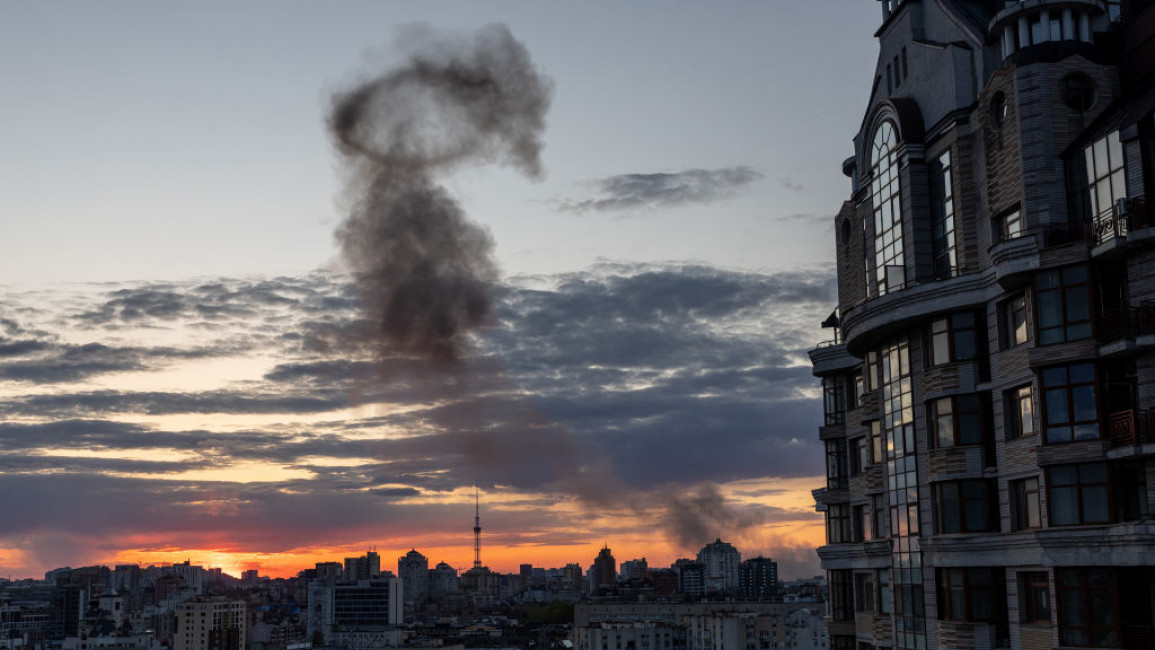Ukraine recaptures more ground as Russia strikes back
Ukraine said Monday that its forces regained yet more ground in the past 24 hours and retook an area seven times the size of Kyiv this month, as Russia responded with strikes on some recaptured areas.
The territorial shifts marked one of Russia's biggest reversals since its troops were turned back from Kyiv in the earliest days of the nearly seven months of fighting, yet Moscow signalled it was no closer to agreeing to a negotiated peace.
The retreat of Russian troops in recent days has drawn weeping and relieved locals into bomb-cratered streets, including on Sunday in the strategic but heavily damaged town of Izyum.
"It's not enough to say I'm happy. I just don't have enough words to express myself," said Yuriy Kurochka, 64.
Yet by Monday Moscow had announced air, rocket and artillery attacks on reclaimed areas in the Kharkiv region, a day after Kyiv said Russian strikes on electricity infrastructure caused power failures.
The retaliatory fire came as Ukraine said forces had retaken more than 20 additional settlements, claiming "Russian troops are hastily abandoning their positions and fleeing".
Kyiv had already announced the recapture of Izyum in the country's east, while President Volodymyr Zelensky said Monday that Ukraine's forces retook a total of 6,000 square kilometres (2,320 square miles) from Russian control in September.
"Ukraine has turned the tide in its favour, but the current counter-offensive will not end the war," US think tank Institute for the Study of War tweeted.
Defence Minister Oleksii Reznikov told French daily Le Monde, in an interview published Monday, the war has entered a new phase with the help of Western weapons.
Moscow conceded having lost territory -- which experts saw as a serious blow to its war ambitions -- but Kremlin spokesman Dmitry Peskov saw no prospects for negotiations.
"The special military operation continues and will continue until the objectives that were originally set are achieved," he added, using Russia's terminology for the internationally condemned war.
'Weapons, weapons, weapons'
The Russian strikes hit 15 locations on Sunday, from Kramatorsk in the east to Mykolaiv in the south and Dnipro in between, Ukraine's military said.
Ukraine had already lost all power from the Russian-controlled Zaporizhzhia nuclear plant, threatened by shelling since February's invasion.
The country's nuclear energy agency said the final reactor at the plant -- Europe's largest nuclear power station -- had been shut off as a safety measure.
Kyiv and Moscow have shown "signs that they are interested" in creating a security zone around the plant, the UN atomic watchdog said Monday.
"What we need here really is Ukraine and Russia to agree on a very simple principle of not attacking or not shelling the plant," IAEA director general Rafael Grossi told reporters.
But later Monday, spokesman for Ukraine's foreign ministry Oleg Nikolenko said the only way to "ensure the nuclear safety and security of the Zaporizhzhia power plant is its de-occupation, demilitarisation and return to Ukrainian control".
"All IAEA efforts must be focused on achieving this goal," he wrote on Twitter.
The speed of Ukraine's fightback has apparently caught Russia's military off-guard, bringing swathes of territory Moscow had controlled for months back into Kyiv's fold.
Images posted by the Ukrainian military showed crates of munitions and military hardware scattered across territory abandoned by Russian forces.
Around the town of Balakliya, AFP journalists saw evidence of fierce battles, with buildings destroyed or damaged and streets mostly deserted.
Ukrainian authorities also claimed to have found four bodies of civilians with "signs of torture" in the recaptured village of Zaliznychne.
Residents reported that Russian troops had killed villagers, the regional prosecutor's office said.
Ukraine's foreign minister used the momentum of the country's fightback to appeal to Western allies for more stockpiles of sophisticated weapons.
"Weapons, weapons, weapons have been on our agenda since spring. I am grateful to partners who have answered our call: Ukraine's battlefield successes are our shared ones," Foreign Minister Dmytro Kuleba said.


![President Pezeshkian has denounced Israel's attacks on Lebanon [Getty]](/sites/default/files/styles/image_684x385/public/2173482924.jpeg?h=a5f2f23a&itok=q3evVtko)



 Follow the Middle East's top stories in English at The New Arab on Google News
Follow the Middle East's top stories in English at The New Arab on Google News


